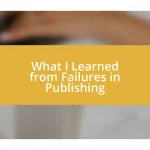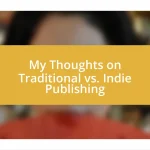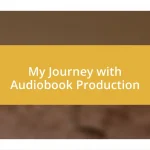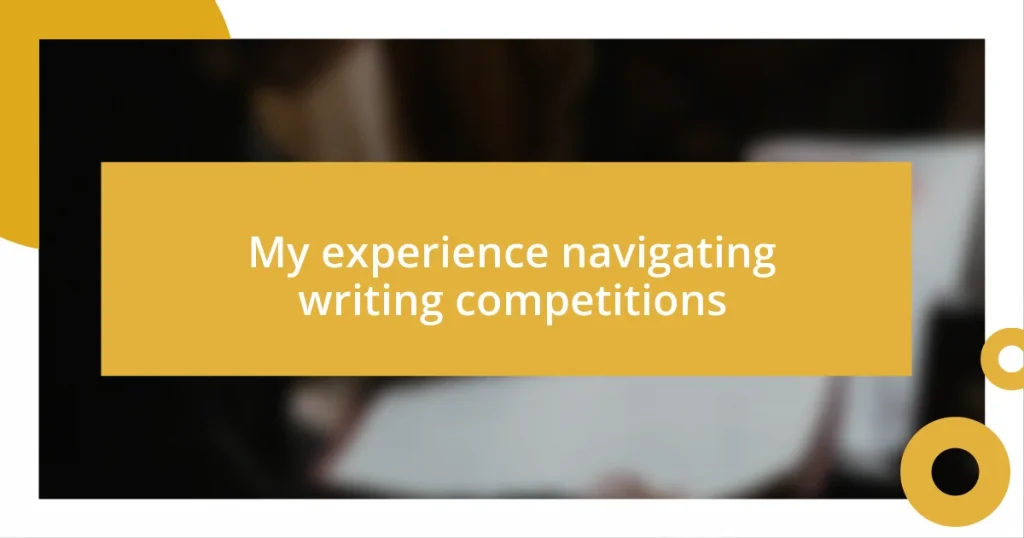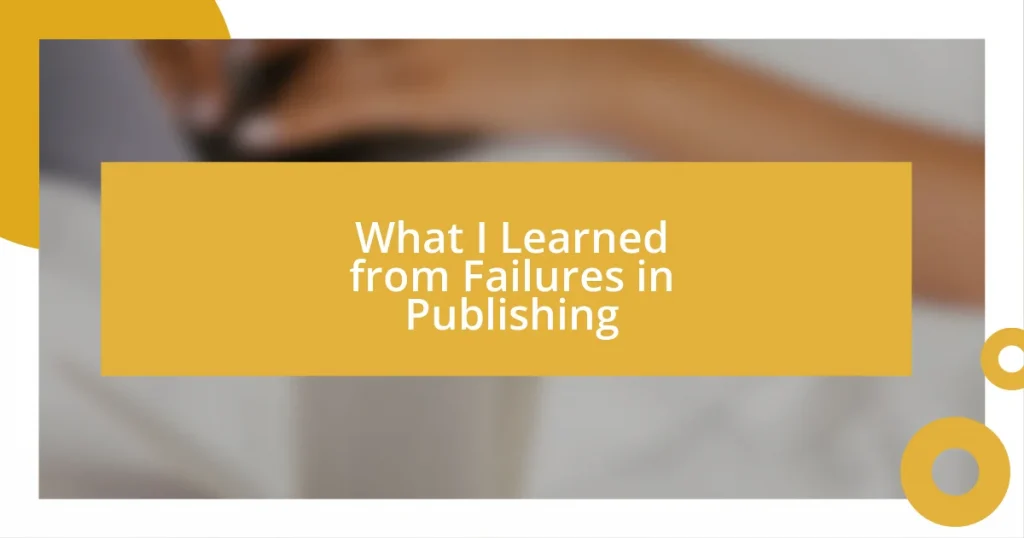Key takeaways:
- Participating in various writing competitions fosters growth, creativity, and resilience by challenging writers to explore different genres and themes.
- Thorough research and understanding of competition guidelines are essential for success, including utilizing platforms like social media and creating comparison tables.
- Embracing feedback and rejection transforms them into growth opportunities, highlighting the subjective nature of writing and the importance of supportive writing communities.
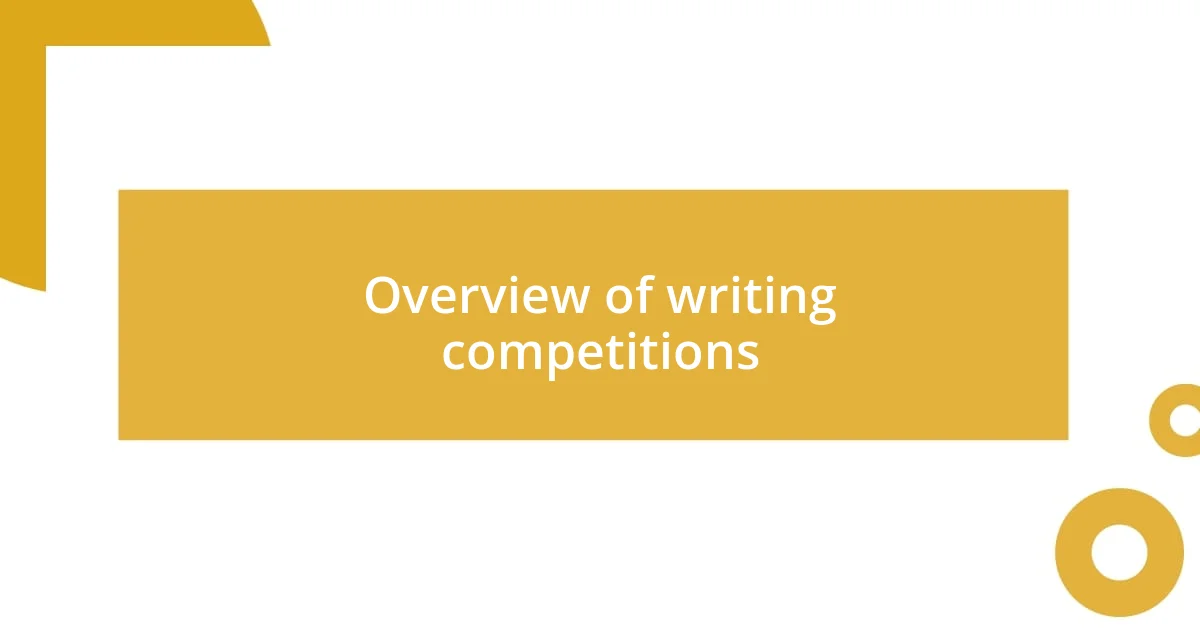
Overview of writing competitions
Writing competitions come in many shapes and sizes, from local contests that celebrate community voices to prestigious national awards that can launch a career. I remember entering my first competition—my heart raced at the thought of sharing my work with strangers. Isn’t it exhilarating to think your words could resonate with someone else?
Each competition often has its own unique theme or genre focus, which can carve out a niche for writers to explore. I’ve found that the variety keeps things fresh; one year I felt inspired to write a flash fiction piece, while another year I poured my soul into a personal essay. What drives you to express yourself in different genres?
The emotional rollercoaster of waiting for results is something every writer can relate to. I recall pacing the floor, anxious and hopeful, as I awaited feedback on my submissions. Have you felt that anticipation? It’s a blend of hope and self-doubt—but it’s such a crucial part of the journey that tests your passion and resilience.
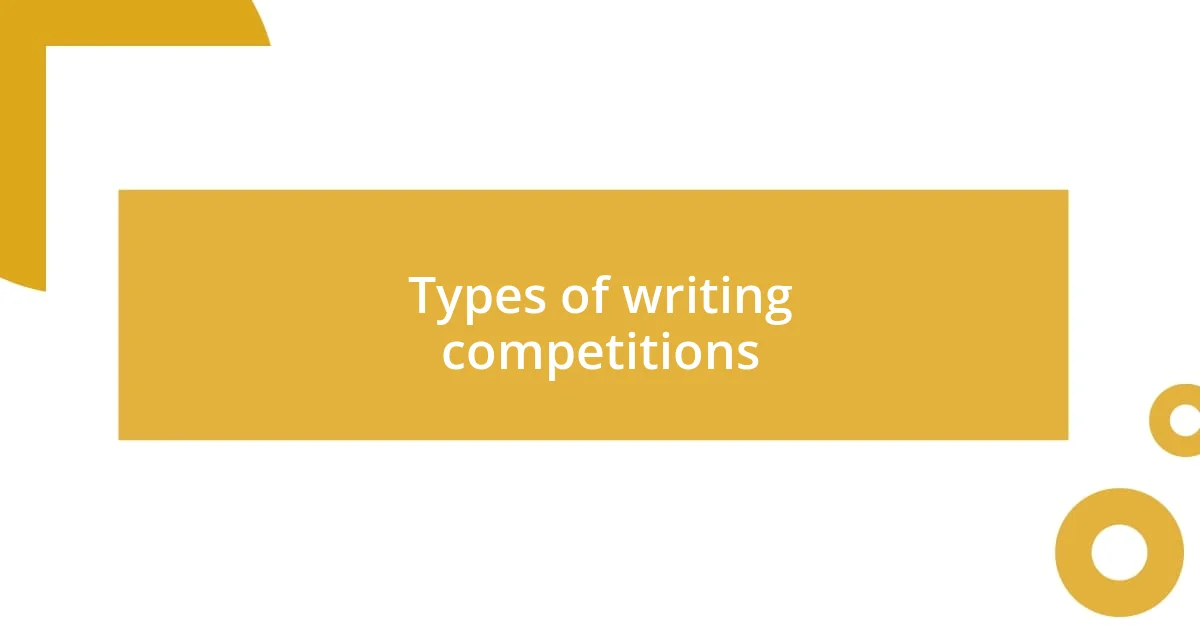
Types of writing competitions
When it comes to writing competitions, the diversity in categories is impressive. I’ve participated in everything from poetry slams to novel contests, and each type offers a distinct experience. Poetry competitions, for instance, allow for lyrical creativity that can be both liberating and intimidating, while short story contests challenge writers to encapsulate powerful narratives in limited word counts. The thrill of tailoring your work to meet specific guidelines can be incredibly rewarding.
Here are some common types of writing competitions you might encounter:
- Poetry Contests: Usually focused on having a theme or style.
- Short Story Competitions: Require succinct storytelling, often under word limits.
- Novel Contests: Often seek complete manuscripts and may involve lengthy submissions.
- Essay Competitions: Involve personal or inventive essays that explore a theme.
- Flash Fiction Competitions: Encourage writing stories within a few hundred words.
I remember entering a flash fiction competition where I had to tell a story in just 300 words. It forced me to choose my words wisely and strip my narrative to its most essential elements, which was both a challenge and a lesson in precision. Each type of competition pushes us to grow as writers, revealing new aspects of our creativity.
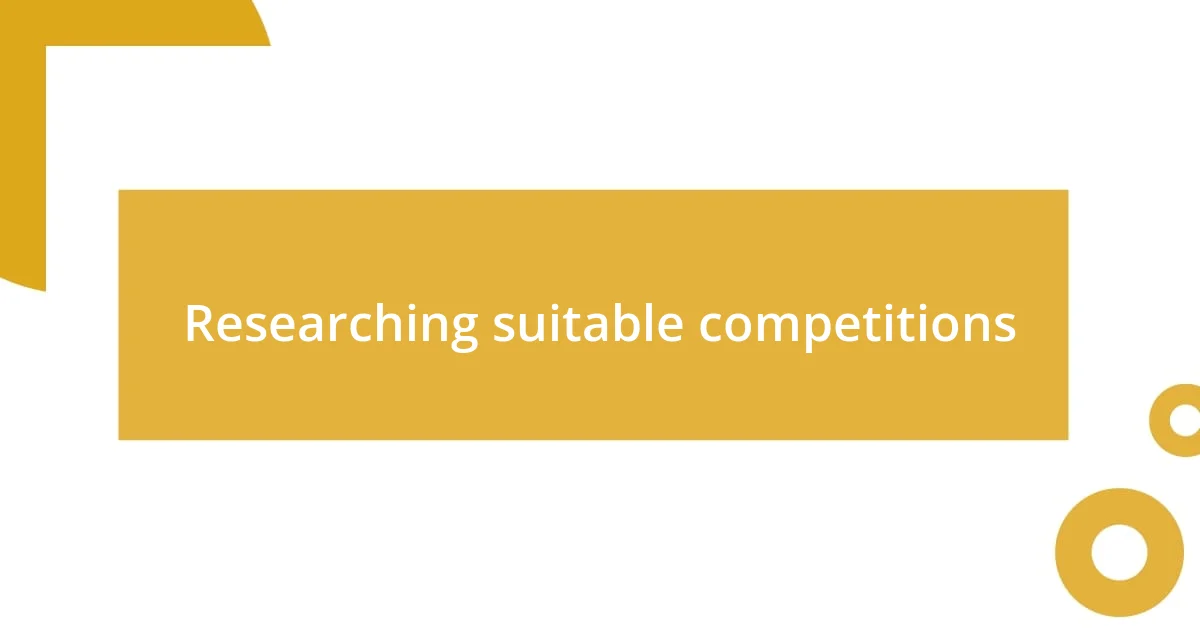
Researching suitable competitions
Researching suitable competitions is a crucial step in my writing journey. I often find delight in exploring different platforms, from literary magazines to community centers, that announce writing competitions. I once stumbled upon a quirky online contest that specifically invited the most bizarre stories—my mind raced with possibilities! This variety helps me connect with my own interests and the themes I’m passionate about, which ultimately enriches my writing.
As you dive into research, don’t hesitate to utilize social media and forums dedicated to writers. Places like Twitter or Reddit often showcase competitions, giving you insider tips that traditional searches might miss. On one occasion, I followed a hashtag and discovered a local competition that was the perfect fit for a poem I had written, transforming it from an overlooked draft to a piece that was celebrated. It’s amazing how serendipitous moments can happen when searching for opportunities.
Lastly, I’ve developed a simple comparison table to assess different competitions. It keeps my thoughts organized and helps measure the key aspects—fees, genres, and prizes—so I can discern which contests align more closely with my goals. Keeping track this way has saved me a lot of time and energy in deciding where to submit.
| Competition Name | Entry Fee | Genres | First Prize |
|---|---|---|---|
| Local Voices Contest | Free | Open Theme | $500 |
| National Poetry Slam | $20 | Poetry | Publication |
| Short Story Challenge | $15 | Fiction | $300 |

Preparing your submission materials
When preparing your submission materials, understanding the specific requirements of each competition is essential. I remember once overlooking the word count for a poetry contest—my submission was beautifully crafted, but I had exceeded the limit. It was a gut-wrenching realization that taught me to meticulously read the guidelines. Have you ever felt that heart-dropping moment when you realize your hard work doesn’t fit the mold? It’s a lesson in precision that I won’t soon forget.
Once you’ve grasped the competition’s guidelines, curating your submission is the next step. This is where I like to step back and consider each piece of work as a part of a larger portfolio. I often assess my writing pieces not just for quality but for how they reflect my voice and style. A poignant flash fiction piece I wrote once didn’t win a contest, but it sparked meaningful conversations among peers. Have you considered how your submission might resonate with readers or judges? Crafting with intention can elevate your work in remarkable ways.
Finally, don’t underestimate the power of a strong cover letter or personal statement, especially if it’s required. In my experience, including a brief note about my inspiration can create a connection with the judges. I once shared how a family story inspired a poem, and while it didn’t win, it was featured for its genuine emotion. Have you thought about the stories behind your words? Making that connection can offer depth to your submission and help your work stand out in a sea of entries.
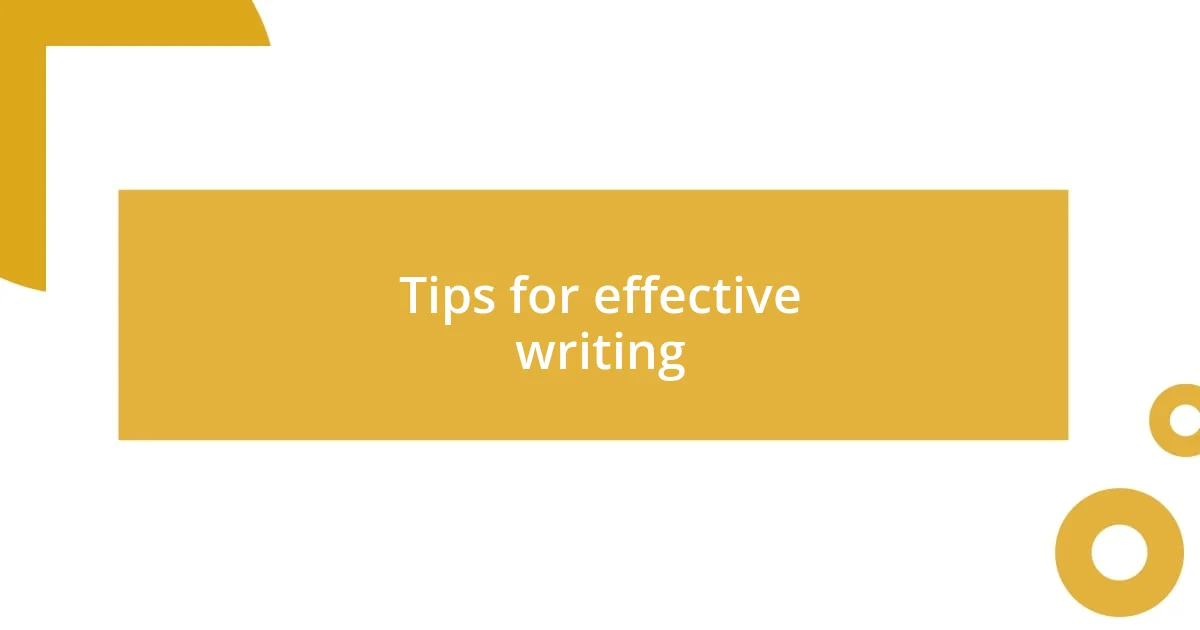
Tips for effective writing
Effective writing requires a clear focus on your audience. I remember when I tailored a short story for a specific competition that celebrated childhood memories. By placing myself in the shoes of the judges—who were reminiscing about their own pasts—I crafted a narrative that resonated deeply with them. Have you considered how understanding your audience can truly shape your writing? It’s a transformative approach that can breathe life into your words.
Another key tip is to embrace revisions. I once submitted an initial draft of an essay and felt pretty confident about it. However, after reflecting on it days later, I realized it lacked clarity. I spent a weekend revising, tightening the prose, and refining my argument. That effort turned the piece from average to something I felt proud of. What if you committed to revising your work several times? It’s amazing how much sharper and more impactful your writing can become.
Lastly, cultivating a unique voice is essential. I often find that blending personal experiences with vivid imagery makes my pieces stand out. For instance, in a memoir contest, I wrote about a summer spent at my grandmother’s farm, weaving sensory details of the sun-drenched fields and fragrant produce that transported readers into my world. Have you explored what truly makes your voice distinctive? Harnessing that authenticity can create connections with your readers that are powerful and lasting.
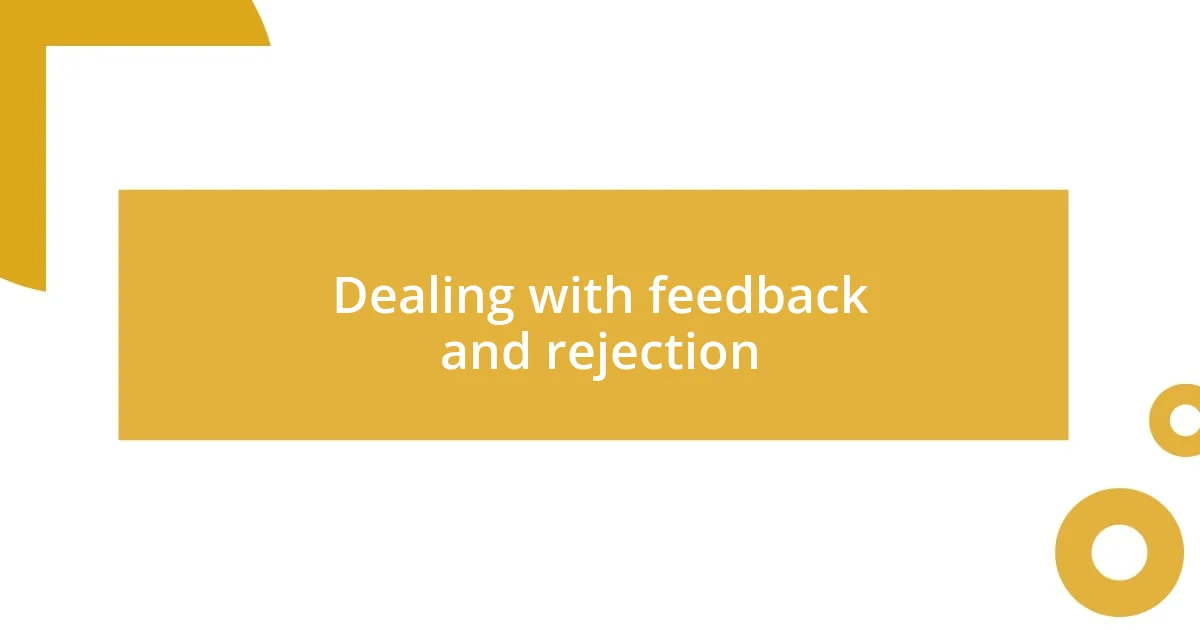
Dealing with feedback and rejection
Receiving feedback can be a rollercoaster of emotions. I recall getting my first set of comments after a competition entry; they were a mix of praise and criticism. I felt elated by the compliments but somewhat deflated by the suggestions for improvement. It forced me to grapple with the reality that even my best work might not resonate with everyone. Have you ever faced a similar dichotomy? Understanding that feedback is a tool for growth has been pivotal in my journey as a writer.
Rejection, on the other hand, hits differently. The first time I received a rejection letter, it felt personal. My heart sank, and I wondered if my voice mattered at all. However, as I continued participating in competitions, I learned to see rejection as a stepping stone rather than a stumbling block. I started to remind myself that every successful writer has faced their share of rejections. What if these moments are merely echoes of a path toward refining my craft?
Moreover, I discovered the importance of supportive communities when dealing with these challenges. Joining a local writing group was a game-changer for me. I remember sharing my rejected piece, only to hear others’ experiences of similar setbacks. Sharing felt cathartic, and it helped shift my perspective. Have you considered building connections with fellow writers? The empathy and shared wisdom can be comforting, transforming rejection into motivation to keep writing and improving.
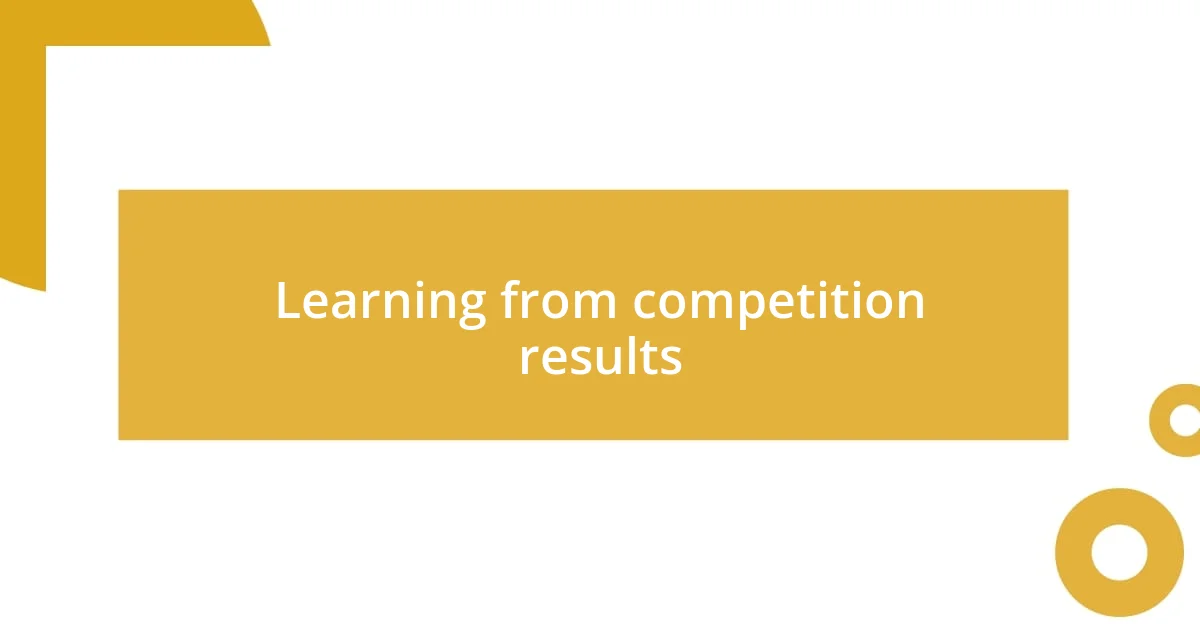
Learning from competition results
Learning from competition results is an enlightening experience. After one particular contest, I received my scores and comments, which pointed out strengths I never recognized in my writing. It was eye-opening to see how these aspects resonated with the judges. Have you ever encountered feedback that highlighted something you undervalued in your work? Embracing this kind of feedback can pave the way for personal growth and deeper understanding of your strengths.
One memorable result came from a poetry competition where I didn’t place, but the judges praised my imagery. They mentioned how vividly I painted emotions with my words. While I initially felt disappointed, I later channeled that feedback into my next submission, focusing on creating even stronger imagery. Have you ever found that constructive criticism can be a catalyst for your next creative leap? It taught me that even results I perceived as setbacks could redirect my path towards greater clarity and creativity.
Looking back, I realize that each competition result is like a compass. They guide my writing journey and help me navigate my progress. I remember a time when my piece received mixed reviews—some loved it, while others didn’t connect at all. This taught me the vital lesson that writing is subjective. Have you considered how differing perspectives can shape your development as a writer? Embracing this unpredictability can foster resilience, encouraging me to explore different styles and themes in my future works.
